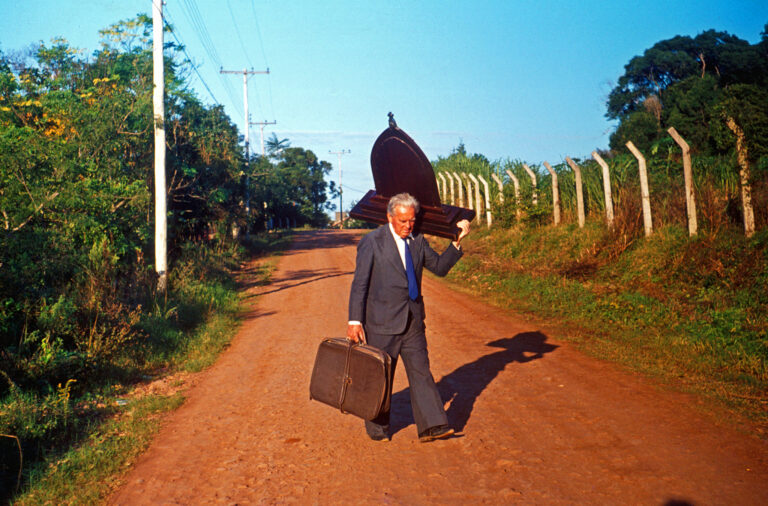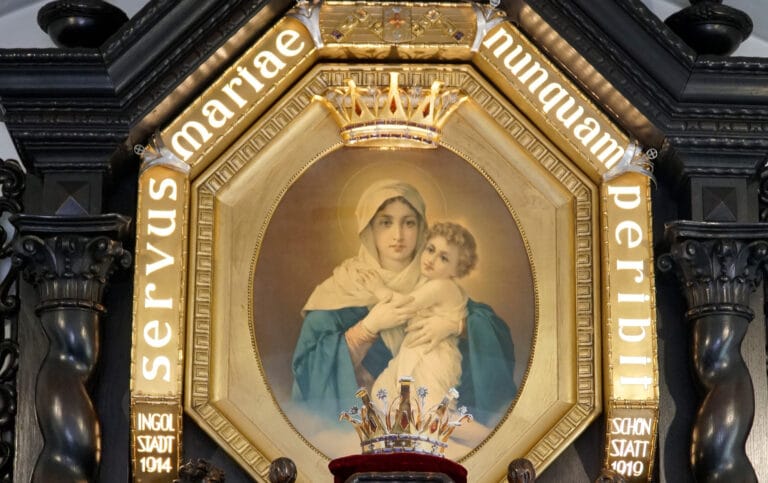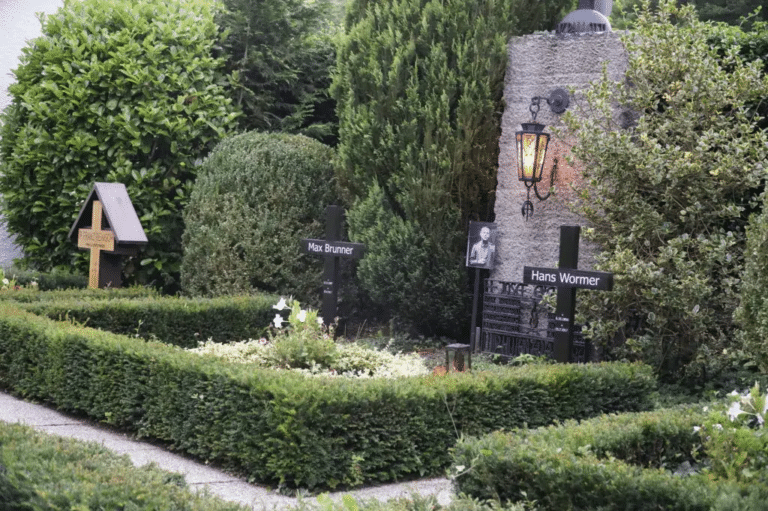In times of fear, pandemic, and loss of hope and trust, we spontaneously look toward people whose example we can follow, who can inspire us in this crisis. One person who mastered difficult life situations and who can tell us a lot about living in a pandemic today is Sister Emilie Engel. Born exactly 128 years ago today on February 6th in Husten, Sauerland, Germany the fourth of twelve children, she grew up in a large family. Her situation was far from ideal. At an early age she suffered from the misconception that God is a strict judge so throughout her childhood and adolescence she experienced grave fear and compulsions that stifled her joyfulness.
As trust grows, fear fades
As a young teacher in the socially deprived area of the Ruhr valley, not only did she teach the children of miners, but also looked after entire families in their poverty, illness, and spiritual needs. In 1921, she encountered Schoenstatt and the Covenant of Love and became one of the cofounders of the community of the Sisters of Mary of Schoenstatt. Despite suffering from pulmonary tuberculosis in 1935 and the following years of numerous stays in the hospital and sanatorium, she became a loving, motherly woman in whom people found a friend, concerned for their questions and difficulties. Through Father Kentenich’s delicate spiritual accompaniment, a new image of God grew in her: the loving Father God who loves her personally to whom she can trust herself entirely. This faith in Divine Providence freed her step by step from her deep-seated fears and gave her a strong inner joy, deep serenity, even carefreeness despite the war and post-war periods. As trust grows, fear fades.
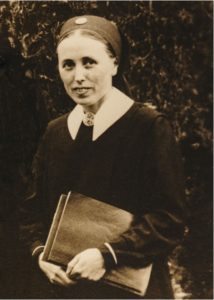
Dare to leap into the arms of God
She always dared to jump into the arms of God and speak her “Yes, Father”, even to the mercilessly unyielding disease (she was almost completely paralyzed and could not even speak) and an uncertain future. Her favorite prayer (song) is a summary of her faith and life:
“I know you are my Father; I feel secure in your protection.
I do not ask the way you lead; I blindly follow your direction.
And if you placed into my hands my life that I myself direct it,
I then would say, “Oh, take it back! Your trusting child is well protected.”
She died in 1955. Her grave in Metternich is visited by many people and is lovingly adorned, including small national flags from the visitors’ countries. She has helped many people in their needs. Her beatification process was opened in 1999 and has been continued in Rome since 2002. “Only” a medical miracle is missing for her beatification.
Sister Emilie for today
Father Kentenich was always convinced that Sister Emilie had to suffer so much hardship, weakness, and fear herself because God gave her a special mission for the people of our times whose basic condition is fear. And that’s exactly where the pandemic leaves us: fear. We are afraid of being infected, we are afraid of dying alone in the hospital. We are afraid that politicians will make wrong decisions. We fear what corona deniers will lead to in our country and our society. And then there is another fear that is totally new: the fear of infecting others, the fear that others will become seriously ill or die because we have infected them.
Ambassador of faith in Divine Providence
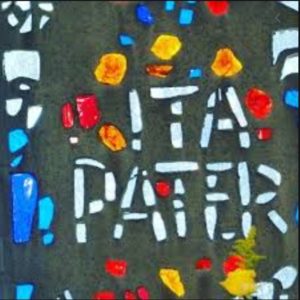
Sister Emilie can accompany us through narrow tunnels of fear. She put all her trust in a loving, kind, omniscient Father God. She advises us: “Therefore, we want to see and follow God’s signs, we want to hear his voice everywhere and obey it. We want to pay attention to the doors that his hand opens for us.” We need to change our perspective: away from our agonizing fear to searching for God’s signposts, for everything that is possible despite the restrictions. We can look for creative new ways to remain in conversation with the loving Father God throughout the day, at work, activity, or rest. We ask for help, praise and give thanks, expressing complaints or conversing with God. This breaks the chain of fear. Then trust grows and fear decreases.
“A sure way: trusting, persevering prayer”
This is how Sister Emilie learned. She prayed a lot, alone when she was only allowed to lie still and immobile for weeks due to her illness or when she had to endure terrible pain due to surgical interventions. She prayed every day, always in connection with God, following the advice of Father Kentenich: “The deeper you feel your helplessness, the more confidently you should dare to leap into the fatherly arms of God and the Mother of God.”
Let us pray for others, especially for many who are pushing themselves to the limit. They need our prayers. Praying with others will encourage and strengthen our relationships. When we pray, we don’t need to use many words. It is much more important to give God space to communicate his impulses and wishes to us. To pray means to change our perspective, to surrender. It is not about imposing my will on God, but about letting my will be shaped by his.
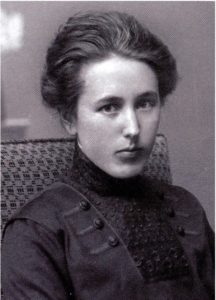
Life from the baptismal covenant
Sister Emilie lived deeply from her baptism, which took place two days after she was born. She expressed it like this: “The mystery of this day is so great, so inexpressible; I cannot even think of the words. How shall I give thanks? With my entire heart, with my whole soul I renew my baptismal promise today. Glory to the Father within me, to the Son within me, to the Holy Spirit within me. Amen.” Can this reverence for the gift of our own life also help us to protect others and ourselves responsibly? Each life is so infinitely precious. The word God spoke at his Son’s baptism in the Jordan applies also to us: “This is my beloved Son (I would hear: my beloved Daughter), with whom I am well pleased.” This promise encourages and allows us to venture out.
Commitment to others
Free of herself, Sister Emilie attended to many people, advising, comforting, encouraging and strengthening, all from the inner impulse: “We must love the poorest people the warmest.” People who turn to others in times of pandemic, who are remain with people who feel alone, who keep contact and closeness through new available ways despite the restrictions get through crises better. This is what it means to love the poorest people the warmest.
New Novena
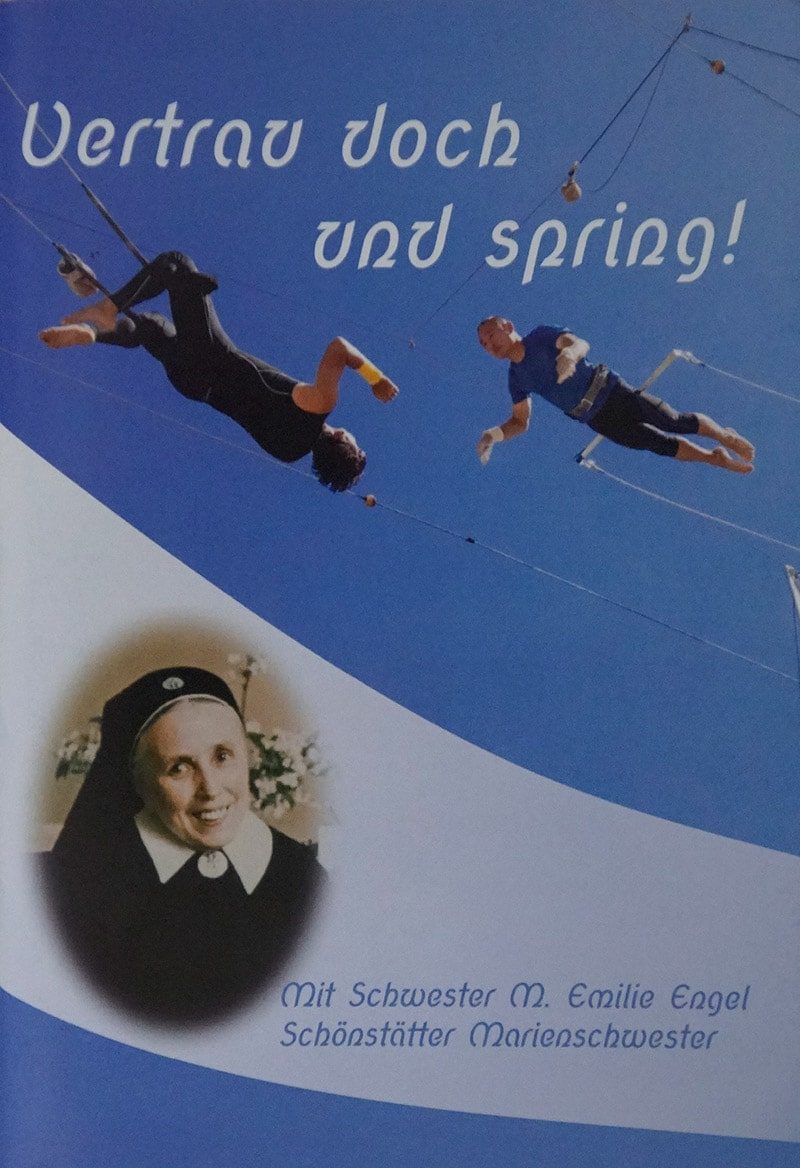
Many people throughout the world experience Sister Emilie bringing light into their life again, the light that radiates the love and protecting care of God. Sister Theres-Marie Mayer has written a new helpful novena. It is currently only available in German and the Spanish translation is being prepared. The revolutionary title: Trust and leap! The novena describes trapeze artists – catchers and jumper – in a lifelike way and, based on Sister Emilie’s life, it is designed to be implemented practically for personal life. With joy, I visit her grave on her birthday and light a candle all of you who are reading this article.
Pictures: archiv, s-ms.org

